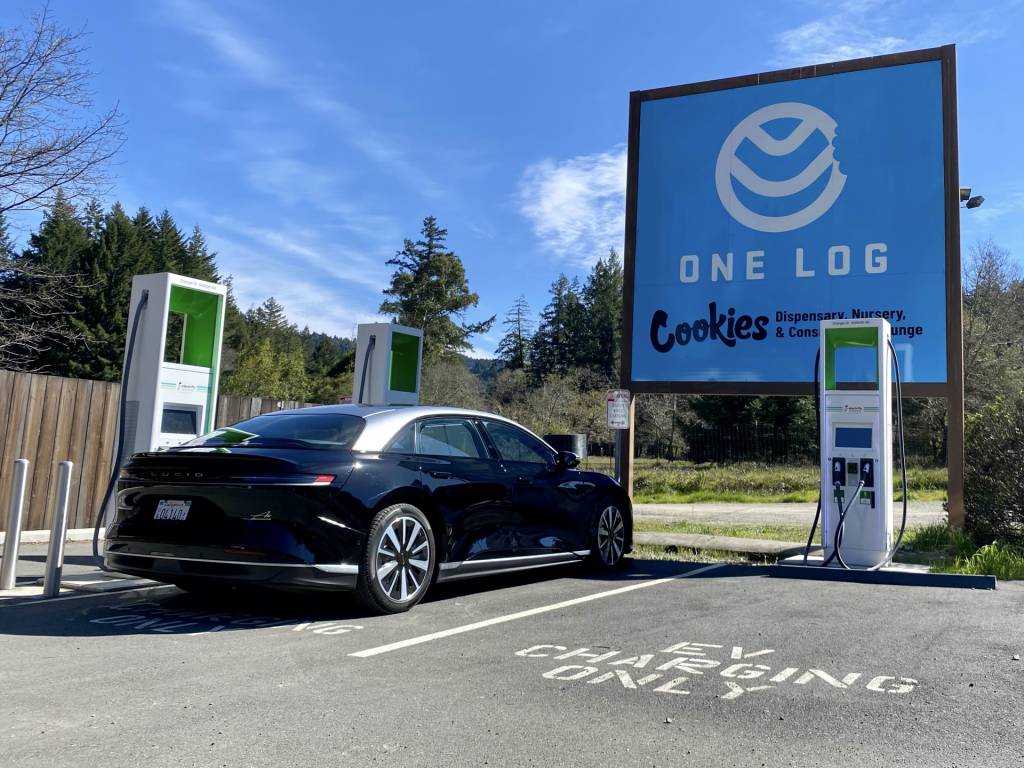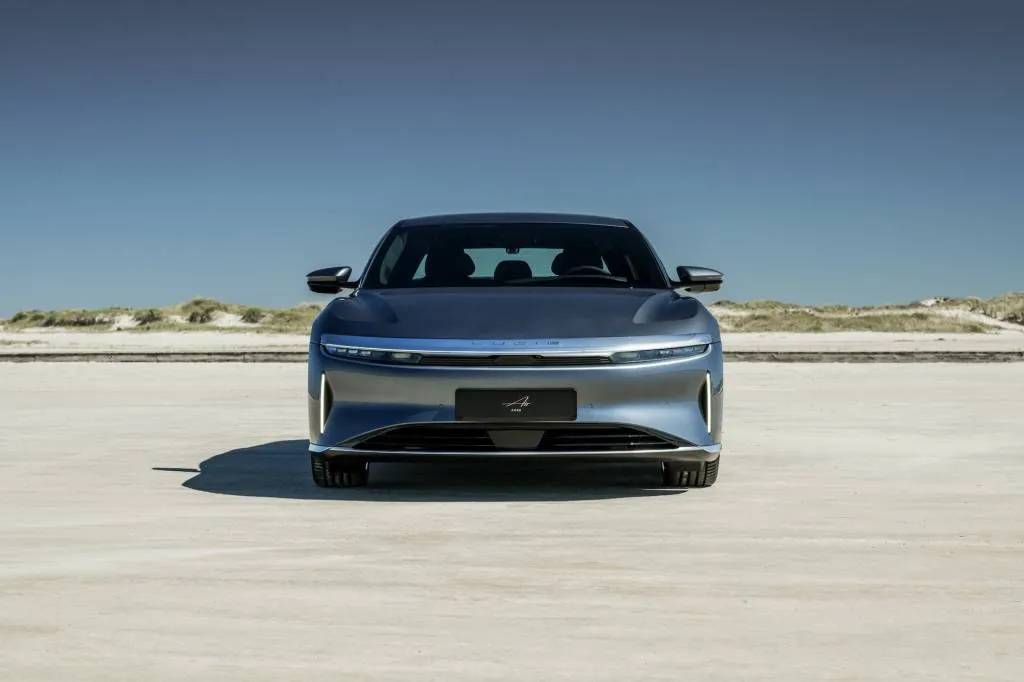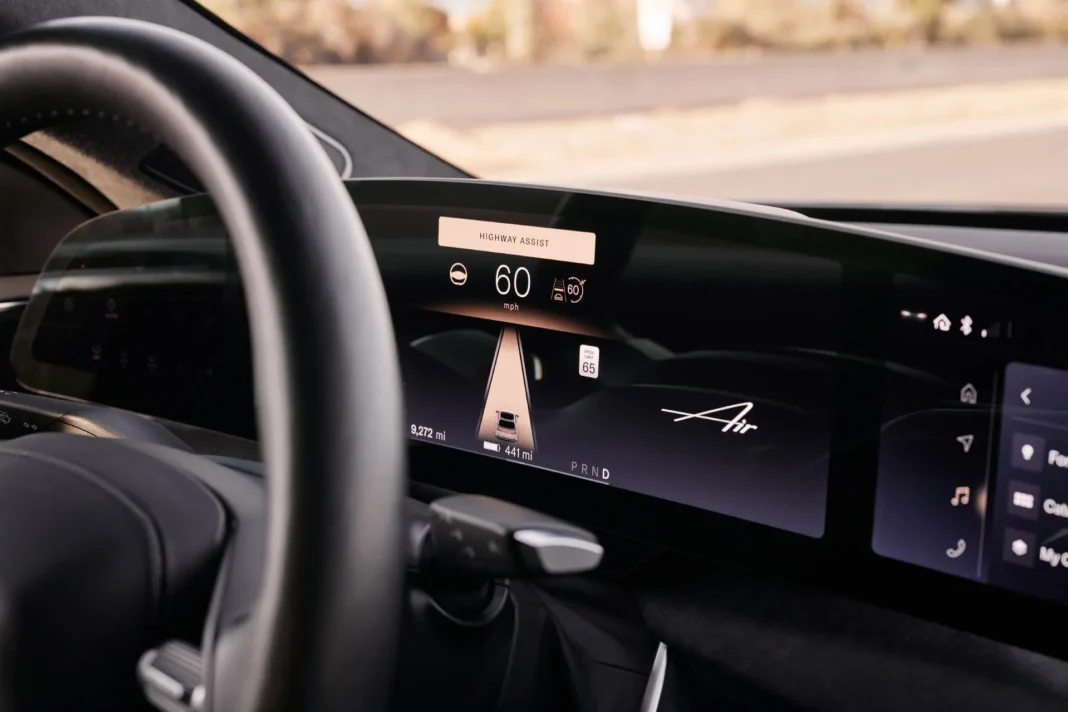- Lucid’s new voice assistant incorporates natural-language interactivity
- SoundHound tech doesn’t rely entirely on a cellular connection
- Already available in Air, coming soon to Gravity
Lucid wants you to have a conversation with your Air or Gravity electric vehicle, and it goes far beyond the requisite wake-up of “Hey Lucid.”
Earlier this month I sat in the passenger seat of an Air, while the driver asked: “My friend suggested that I go check out the NFL stadium while I’m in Vegas; what’s it called?”
A synthetic voice replied within a fraction of a second: “The NFL Stadium in Vegas is called the Allegiant stadium. It’s super cool.”
“Navigate there,” said my seatmate.
The voice eventually confirmed, “Navigating to Allegiant stadium. Follow the road.”

Lucid Assistant powered by SoundHound (demo)
The one in the driver’s seat walking me through Lucid Assistant voice interactivity was Kyle Halstvedt, the technical program manager at SoundHound who helped coordinate this completely new voice assistant for Lucid EVs.
With SoundHound’s voice-and-AI-focused team based in Santa Clara, California, near Lucid’s Newark headquarters, the companies worked closely on the project. Halstvedt aimed to show me that every voice query now has a lot of flexibility, and the voice functionality is now fully in tune with Lucid’s needs—like the need to find the fastest chargers along the way, plan the EV’s route, and precondition its battery to prepare for them.

2022 Lucid Air fast-charging in Garberville, CA
Here it’s especially important that this functionality navigates the nuance—because in a Lucid it can be the difference between one of the quickest EV charging experiences in the world versus one that’s just par.
“That was a fun aspect of this project, that they want to drive things through their own navigation system,” Halstvedt said. “We’re not just using a separate data provider; we’re deeply integrated with their navigation system, and that had to happen.”
Halstvedt noted that’s something SoundHound has experience doing before, and it’s something that Lucid had a particular requirement surrounding the project and the integration. “They appreciated the flexibility of our technical team to build the experience they’re looking for, something that takes a bit of creativity on the technical side,” he said.

Lucid UX 2.4 update
Way more flexibility, better than Alexa
The Lucid Assistant was rolled out starting in September, replacing Alexa as part of Lucid’s UX 2.4 software update. According to Lucid, all Air models in North America and the Middle East now have access to it. Early Gravity models don’t yet have the Lucid Assistant, but they will soon, the automaker told Green Car Reports.
The new assistant, already configurable in six languages, will now better manage navigation and audio, climate control features, or heated seats—all basics that owners previously found challenging. But that’s just the start.
Lucid made a strategic choice about where it wanted its core competency, and voice is at the center of it, Lucid Motors head of user experience Dave Flynt explained to Green Car Reports in December, when that system was still rolling out in Air. “It’s not just, I’m ordering the car around; it’s like, how does the car begin to communicate with me through voice?”
“That really wasn’t possible with our old system,” Flynt bluntly summed.
Alexa wasn’t working for Lucid, and Lucid didn’t mince words about it—although there were likely plenty of drivers’ words minced. The California EV maker announced back in 2020 that it would employ an advanced version of Amazon Alexa to access an extensive array of vehicle functions ranging from small adjustments to finding charging stations, as well as tap into smart home controls. But what owners were finding out in the real world was that such commands within the vehicle depended too much on a strong data connection; account permissions and other factors could get in the way; and ultimately Lucid didn’t have a lot of control over how smoothly it all worked in the real world.

2025 Lucid Air Pure
Context is everything to new Lucid Assistant
“What we need to do a good job, at the natural language commands, is surrounding context—whether that’s the history of the conversation, knowledge about the natural world, or the position, where the user is,” Halstvedt said.
Consumers expect to be able to have an extended conversation about a location or series of locations, filtering it iteratively, and then they want to be able to act on it based on the cumulative results, he said. But few new vehicles can actually deliver that even in perfect connectivity.
SoundHound hasn’t ignored the uncanny smoothness of AI-based queries and chatbots, but it understands that way more is needed within the vehicle—and it needs to pair some of those advantages with traditional in-vehicle voice processing.
“If you just plugged OpenAI’s APIs into your vehicle it would do a really good job of talking but it wouldn’t do a really good job of acting,” Halstvedt said. “We want to bring together those strengths.”
To do that, the voice assistant runs on the reality that it won’t always have a cellular connection out on the road. In what SoundHound calls a native-hybrid model, it streams audio to servers or to a local embedded engine, balancing that in whatever way makes sense.
“Alongside the voice we’re sending, we’re also sending a set of data which we call request info, that represents all of the different attributes, like location, time zone, and more,” Halstvedt said. “That’s a key aspect of answering these questions.”

2025 Lucid Air Grand Touring

2025 Lucid Air Pure

2025 Lucid Air Pure
Fewer “AI hallucinations,” connectivity optional
The approach also lowers the chances of so-called “AI hallucinations,” according to SoundHound—startling or tangential responses that seemingly have nothing to do with what was asked.
While it can seamlessly support those complicated natural conversation queries, it can, as Halstvedt put it, “Work decently well without a connection,” and provide some degree of the same experience.
As an example of something that needs to capture the nuance but doesn’t require a connection, he said, “It’s a little hot in here.”
“Decreasing temperature by two degrees Fahrenheit,” the voice replied.
“If we have cloud connectivity we can enhance those results with better results from the cloud and really mix in various voice generative AI features without having to be really costly from a computing standpoint,” Halstvedt added.
But in Lucid’s new approach, it’s also drawing from around 20 years of SoundHound’s work in understanding natural-language commands without access to the large-language model built into generative AI.

Lucid Air Touring steering wheel controls
Lucid’s voice assistant knows the owner’s manual
Versus the previous voice commands, SoundHound brings in new features, including what it calls vehicle intelligence—meaning “relevant and official information about all of the features the vehicle supports, like where things are and what the buttons do,” it explained in a recent press release on the feature set.
SoundHound has worked with other automakers, but it points to Lucid’s vehicle intelligence questions as where this integration covers new ground in natural language and AI. The whole owner’s manual is available via voice, and the system can sift through it based on your questions—even when you can only describe icons, symbols, or warning lights.
“We applied some computer vision techniques to allow symbols to be described from the vehicle manual… to make knowledge about the car a lot more accessible at the times a user might need to access it,” Halstvedt said.

2025 Lucid Gravity Grand Touring
Voice controls in the 2025 Lucid Gravity
The hybrid model has also made the voice system easy for Lucid to adapt and customize as the Air and Gravity evolve and differ among trim levels. The teams overseeing functionality can change the way something works via the cloud almost instantly, with the local/native backup changed soon after via an update.
“We’re investing heavily in voice; it’s going to be a strategically important UX for us, with a lot of implications around what it means for natural-language interaction and natural-language engagement from the car,” Flynt said.

2025 Lucid Gravity Grand Touring

2025 Lucid Gravity Grand Touring

2025 Lucid Gravity Grand Touring
Indeed, in its 2025 Lucid Gravity SUV, which has a revamped interface, the automaker is offering a digital detox mode that goes with minimalist displays, and there’s a set of mood-and-ambience modes called Vibes. As Flynt hinted, be prepared for voice controls to continue to take center stage there and beyond.
And among all of today’s AI hallucinations, observing that digital detox in voice form too might help drivers simply stay focused on what matters.
